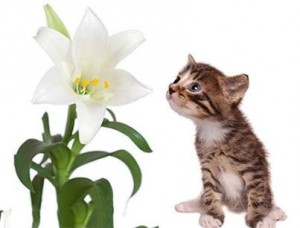
Cats are curious creatures by nature. They love to play, jump, and roam around the house, but sometimes their inquisitive personalities get the best of them. As the plastic eggs filled with candy and the baskets of colorful plastic grass leave the store and enter your home, it’s important to remember that these items can be dangerous for our feline friends.
It’s also important to remember that while lilies, a common household plant, are lovely to see and smell, they are still a safety threat for our cats. The entire lily plant (leaf, pollen, and flower) is considered to be toxic for cats. If you have lilies in your home this Easter, make sure that your cat doesn’t eat any part of the plants.
Symptoms of lily toxicity in cats include lethargy (decreased activity), vomiting, and loss of appetite. These symptoms worsen as the kidney damage progresses, leading to death. Early veterinary treatment is critical. If you suspect that your cat has eaten any part of a lily or its pollen, call your veterinarian immediately.
Holidays are times to celebrate with friends and family. Your feline friends want to celebrate with you. Please do your part to “cat-proof” your home in order to keep them safe this holiday season
